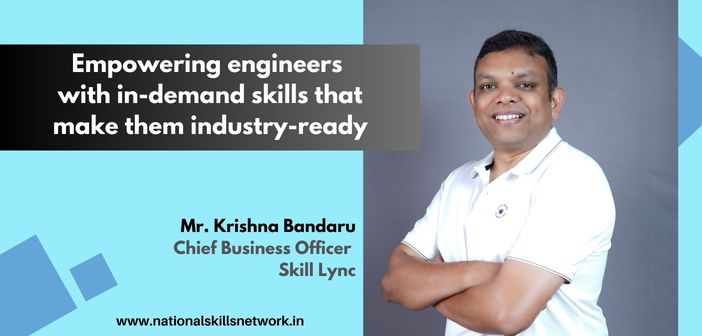“We at Skill Lync strategically target specific industries to ensure comprehensive and tailored training for its participants. Skill Lync plays a crucial role in cultivating a competent and job-ready talent pool in India. By narrowing the gap between academic learning and industry demands, we contribute to fostering growth and advancement in India’s engineering and technology sectors,” said Mr. Krishna Bandaru, Chief Business Officer at Skill Lync.
To learn more about industry-relevant skills for engineering students, upskilling courses at Skill Lync, skill-integrated courses in Electric Vehicles (EVs) and more, we spoke with Mr Krishna Bandaru, Chief Business Officer, Skill Lync.
Below are a few excerpts from our conversation. You can watch the full video on our YouTube channel.
Q. Please tell us more about Skill Lync and its vision.
A. Skill Lync, an initiative incubated in Silicon Valley’s Y Combinator in 2019, is driven by a vision to bridge the gap between academia and industry for engineering students and early working professionals. The primary goal is to make these individuals more industry-ready, enabling a seamless transition from graduation to employment. Recognizing the crucial need to address employability concerns among the vast number of engineering graduates in India, Skill Lync focuses on the supply side, making talent more readily available for the industry.
Skill Lync offers specialized courses catering to diverse industry domains in:
- Core engineering skills (mechanical, electrical, electronics, civil, and biomedical)
- Computer science engineering (data analytics, AI, ML, full-stack development)
Skill Lync serves three customer segments:
- Business-to-customer (B2C): Students, graduates, and working professionals upskill themselves by directly accessing the platform’s courses.
- Business-to-business (B2B): Corporates partner with Skill Lync to upskill their employees through tailored training programs.
- Business-to-academia (B2A): As approved by the new educational policy, academic institutions and government initiatives collaborate with Skill Lync to provide credit-based coursework using the platform’s content.
Q. How does Skill Lync integrate courses for the automotive sector, particularly in the area of EVs, which is gaining significant importance in the automotive industry?
A. Skill Lync’s automotive sector courses cater to the industry’s significant transformation, driven by the electric vehicle revolution and increasing integration of electronics and software. The coursework is designed to meet the demands of skilled professionals in mechanical, electrical, electronics, and computer science engineering. With signature courses in electric vehicles and autonomous systems, Skill Lync attracts around 8,000 students annually from various locations, including India, the US, and Germany, enabling them to upskill and excel in automotive projects.
Q. How does Skill Lync address practical learning in its EdTech platform? What technologies are utilized to provide simulations and hands-on experiences?
A. At Skill Lync, our focus is not on preparing engineers for shop floor roles but on equipping them with computational tools used in the industry. We have partnerships with leading software OEMs like MathWorks, Dassault Systemes, Ansys, Altair and more, providing our students access to these tools on the cloud. Projects constitute 40% of the learning experience, allowing students to work on real industry problems with the support of 200 full-time faculty members who guide and mentor them throughout their skilling journey.

Q. Does Skill Lync’s platform caters to the continuous upskilling needs of engineers who are already employed and seeking to enhance their skills on the job?
A. A significant portion of Skill Lync’s B2C customers comprises working professionals within their first two to three years. The platform’s technology allows them to learn at their own pace and convenience, often accessing resources in the evenings and on weekends. Skill Lync caters to this trend, providing resources accordingly. Additionally, many corporates purchase our services to upskill their employees.
Q. Does Skill Lync offer placement assistance or help students secure jobs after they complete their programs? If so, how does this aspect fit into the platform’s model?
A. Skill Lync offers a comprehensive set of services to learners, including access to proprietary learning material, live virtual tutoring, and career services. The platform’s corporate relations team facilitates job interviews for students who complete mandatory courses and assessments successfully. Approximately 2,000 students secured jobs in the last year through Skill Lync’s platform.
Also read: How to build a career in Tool Engineering and Digital Manufacturing with the right skills
Q. What advice would you like to convey to engineering students on the importance of upskilling and how they can best incorporate this approach into their education?
A. One crucial starting point for engineering students is to increase their awareness of diverse job opportunities. For example, mechanical engineers can leverage their knowledge for field jobs or manufacturing and engineering R and D and services roles by acquiring computational software skills. Despite recent economic slowdowns, India continues to attract automotive companies, leading to increased demand for skilled mechanical engineers. Demonstrating their skills and showcasing portfolio projects have become essential in the job market, instead of depending only on resumes.












